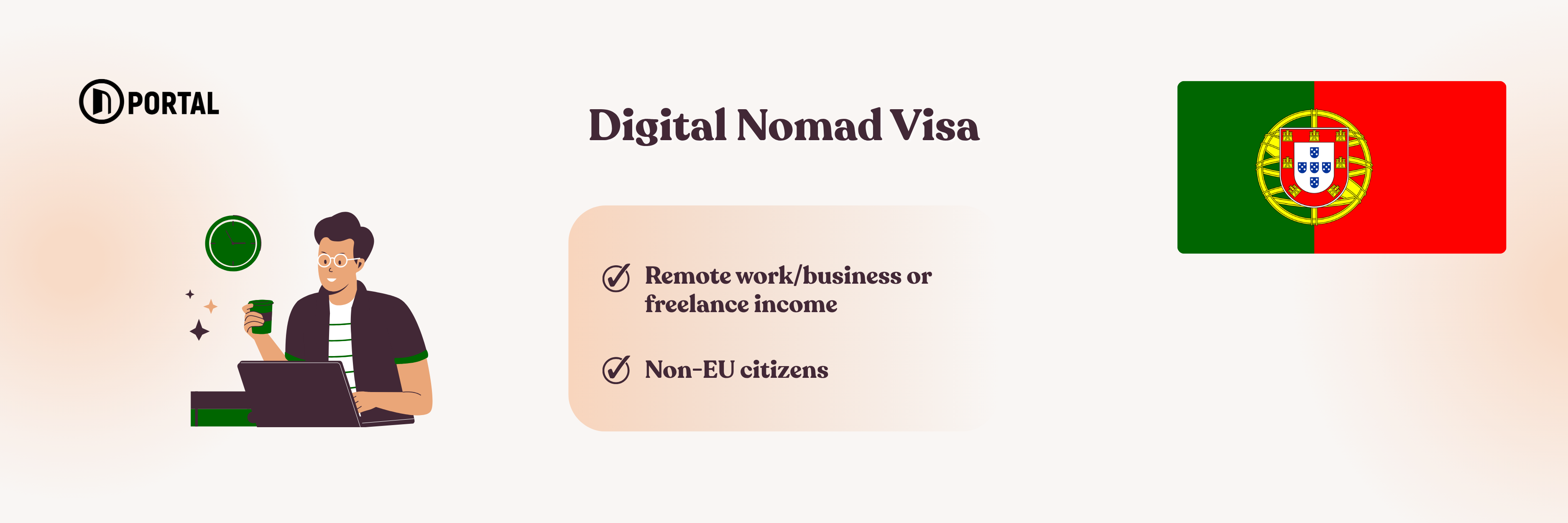
The Portugal Digital Nomad Visa (D8 Visa) allows non-EU/EEA/Swiss remote workers, freelancers, and online entrepreneurs to legally live and work in Portugal. This flexible visa supports both short and long stays, offering a clear path to renewing your residency and eventually qualifying for permanent residence or citizenship. It combines freedom with structure—ideal for those wanting stability while working remotely.
Eligible Applicants
Must be at least 18 years old and not hold EU/EEA/Swiss citizenship.
Must work remotely—either for foreign employers or as self-employed freelancers/entities based outside Portugal.
Income & Financial Requirements
A minimum gross remote income is required: typically around €3,280–€3,480 per month.
Demonstrable savings are expected, commonly around 12× the Portuguese minimum wage, which is about €10,440, to show financial stability.
Additional amounts may apply for dependents (e.g., 50% extra for spouses, 25–30% per child).
Document Checklist
Valid passport and proof of remote work (e.g., contracts, invoices, registration).
Clean criminal record certificate (apostilled and translated if needed).
Proof of accommodation, preferably covering at least a year, though shorter stays may be accepted with explanation.
Health insurance: For visa application, minimum €30,000 coverage for the first four months; later switch to Portuguese plan.
NIF (tax number) and a Portuguese bank account—often needed before submitting residency documentation.
Legal Stability: Work remotely while living legally in Portugal with both visa and residency permits.
Schengen Access: As a resident of an EU Schengen country, you can travel freely within the zone.
Path to Permanence: Residence can be renewed for up to 5 years. After 5 years, you may apply for permanent residency or citizenship.
Tax Visibility: While the former Non-Habitual Resident (NHR) tax regime ended for new applicants in 2024, it's important to be aware of tax residency thresholds—spending over 183 days a year in Portugal makes you a tax resident.
Quality of Life: Portugal offers excellent healthcare, school systems, and vibrant culture—all accessible to visa holders.
Imagine a freelance software developer in the U.S. earning over €3,400/month and having €11,000 in savings. They apply for the D8 Visa, supplying their income proof, health insurance, accommodation booking, and criminal record. After arriving with the visa, they attend their residency appointment in Portugal and receive a two-year residence permit. They enjoy working remotely with legal certainty, can travel throughout Europe freely, and after five years become eligible for permanent residency—or even citizenship.
There are two types: a temporary stay visa (up to one year, renewable) and a residence visa granting a two-year permit that can be renewed.
Yes. The visa allows inclusion of spouses and dependent children, with respective increases in needed income or savings.
To maintain your permit, avoid spending more than six consecutive months or a total of eight non-consecutive months outside during a two-year period.
No. From January 2024, new applicants are no longer eligible for NHR. Existing beneficiaries have transitional arrangements.
Yes. After five years of legal residence, you can apply for permanent residency or citizenship—subject to basic language and integration requirements.